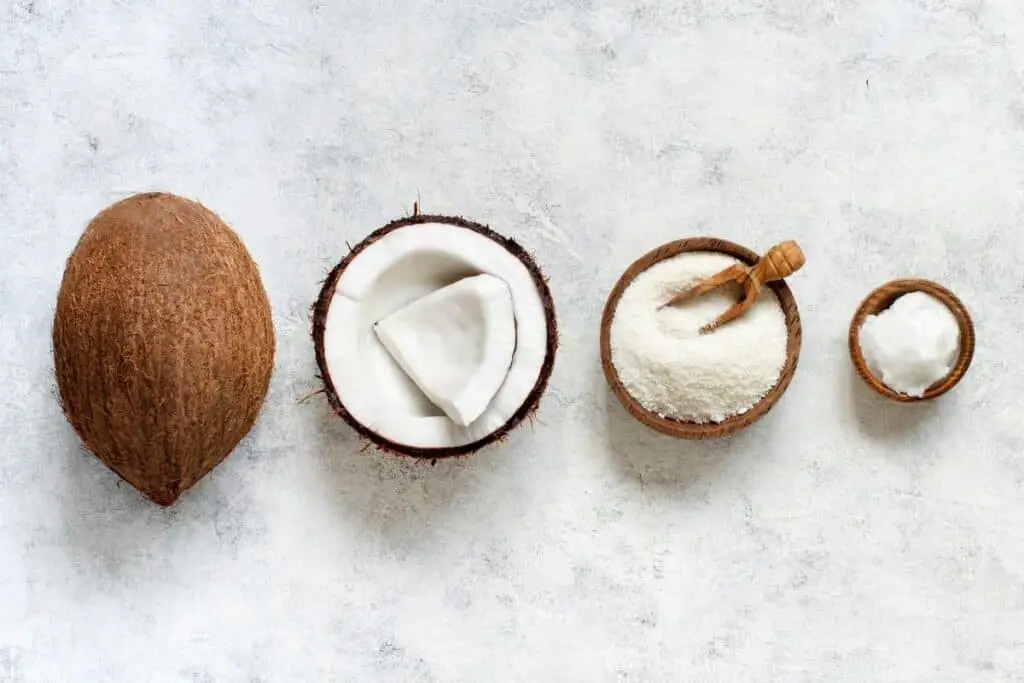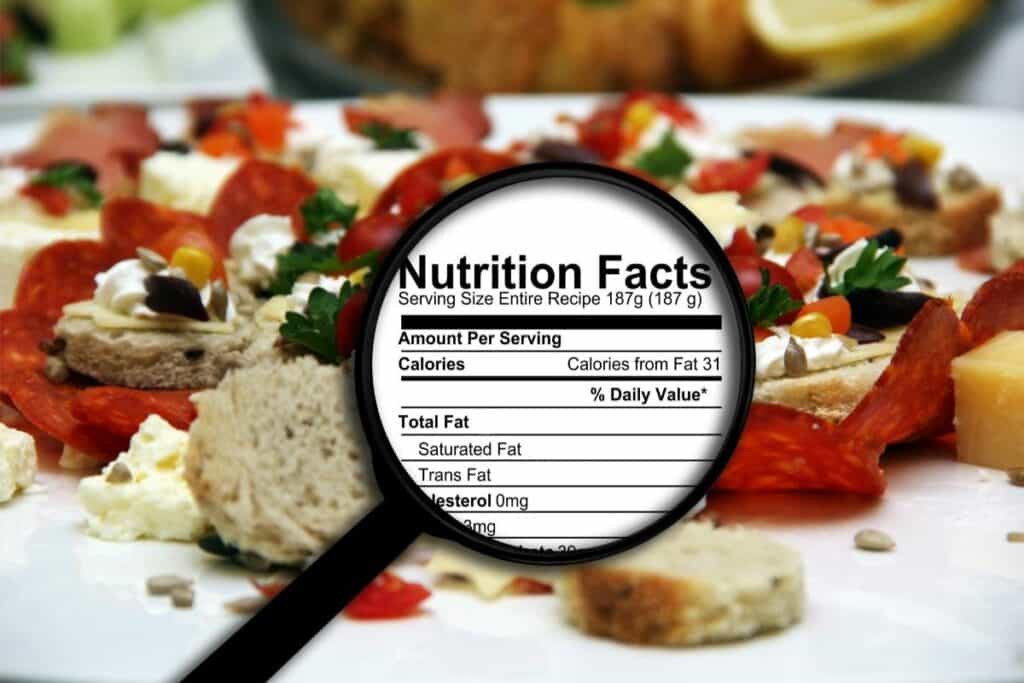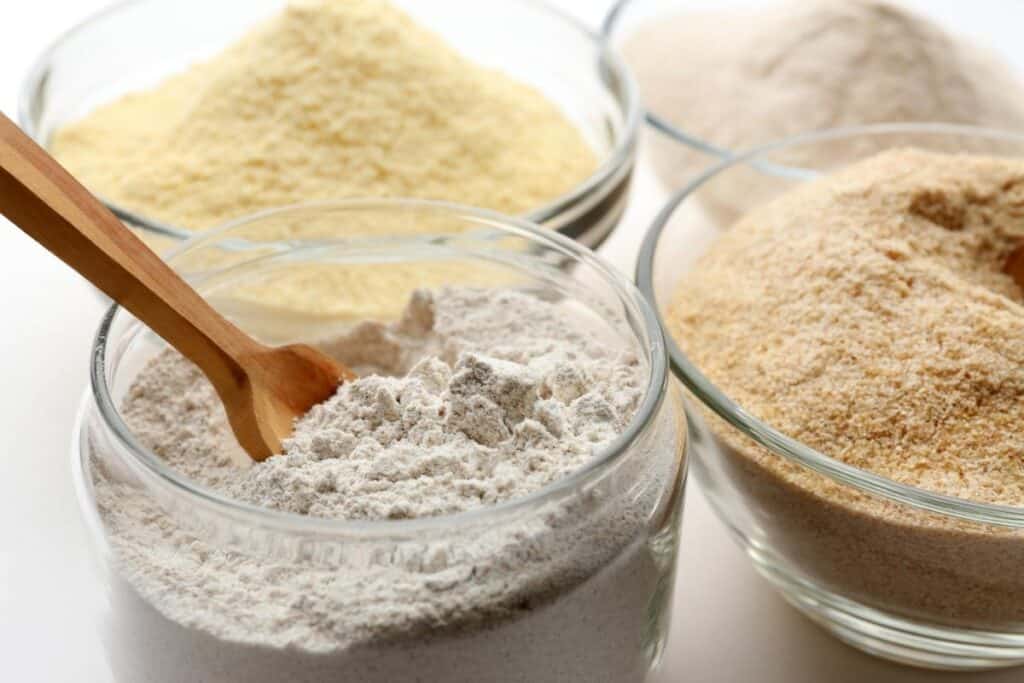Coconut flour has become a staple ingredient in gluten-free baking. Not surprisingly, it is made from ground dried coconut meat. It contains medium-chain triglycerides (MCT) and lauric acid, both of which are beneficial for health.
MCTs are easily digested fats that can provide energy for the body. Lauric acid helps fight infections and boost immunity.

What Is Coconut Flour?
As mentioned above, coconut flour is made of ground dried coconut meat from a palm tree. It is ground into a soft and fine powder, which has a very distinctive smell and taste.
Generally, this flour is used as an excellent alternative to wheat flour. It can’t always be substituted, as it can sometimes depend on the recipe that you are using. However, it is a great alternative when you can use it.
This flour will provide you with many health benefits, so we will talk in greater detail further along in the article. But it’s not all sunshine and pineapple, even though this is a type of flour, it doesn’t always behave as you would expect flour to behave. We’ll explain more about that also.
Is Coconut Flour The Same As Almond Flour?
Neither flour contains any wheat. Therefore, they are ideal gluten-free flour alternatives that you can use while baking. As we know, coconut flour is made from dried and powdered coconut, while almond flour is made with ground almonds.
As a result, these flours look similar and are created in similar ways. They can be both used as an alternative to wheat flour. However, if you have a nut allergy, then you will be allergic to almond flour.
Therefore, coconut is a great nut-free alternative flour. Although, if you are allergic to tree nuts, then you will also be allergic to this flour.
Nutritional Facts About Coconut Flour

Coconut flour is low in fat, calories, carbohydrates, sodium, and cholesterol. However, it does contain saturated fat. This means that if you eat too much, your risk of heart disease will increase.
This flour is high in fiber, protein, iron, zinc, magnesium, phosphorus, potassium, calcium, copper, vitamin B1, vitamin B2, vitamin B6, vitamin C, folate, niacin, riboflavin, thiamine, pantothenic acid, biotin, choline, and selenium.
It also contains antioxidants such as phenolic compounds, flavonoids, carotenoids, phytosterols, and saponins. These all help protect our bodies against diseases and conditions including cancer, diabetes, cardiovascular diseases, obesity, osteoporosis, arthritis, and Alzheimer’s disease.
Some other health benefits include:
- Promotes Weight Loss – Coconut flour provides us with a lot of nutrients that promote weight loss. These nutrients include fiber, protein, iron, and magnesium. Fiber helps keep us full longer and keeps our metabolism working properly.
Protein helps build muscle and maintain a healthy immune system. Iron helps produce red blood cells, which carry oxygen around our bodies. Magnesium helps regulate appetite and control blood sugar levels. - Reduces Risk Of Heart Disease – Coconut flour contains a large amount of fiber, which reduces the risk of heart disease by keeping cholesterol levels down. Fiber also lowers bad cholesterol (LDL) and raises good cholesterol (HDL). It also helps lower triglycerides, which is another form of cholesterol.
Protects Against Cancer – It is believed that coconut flour prevents the growth of cancerous tumors. This is because it contains lauric acid, capric acid, caprylic acid, and myristic acid. These acids work together to kill bacteria and viruses.
Boosts Immunity –– Coconut flour increases our immunity to help us fight off infections. It contains vitamins A and E, which help boost our immune system. Vitamin A increases white blood cell production, and vitamin E prevents damage to the immune cells. - Enhances Energy Level – Coconut flour improves energy level by providing us with more energy than other flours. It contains medium-chain fatty acids, which make us feel fuller faster.
Medium-chain fatty acids also increase the number of mitochondria in our cells, which allows our cells to use oxygen more efficiently.
Calories/Carbs/Protein Per Cup
Coconut flour has many health benefits, due to being high in iron, fiber, potassium, and vitamins.
A 1/4 cup serving contains:
- 120 calories
- 18g of carbohydrates
- 6g of sugar
- 10g of fiber
- 6g of protein
- 3g of fat
Therefore, 1 cup contains:
- 480 calories
- 72g of carbohydrates
- 24g of sugar
- 40g of fiber
- 24g of protein
- 12g of fat
Is Coconut Flour Gluten-Free?
We are aware that coconut flour is made from the dried and powdered coconut fruit. As a result, it doesn’t contain any gluten, unlike your typical white wheat flour. Therefore, you can use this flour as a substitute for “regular” flour, if you have a gluten-free diet.
Is It Good For Paleo Diets?
The Paleolithic diet, Paleo diet, is also known as the caveman or stone-age diet. In this diet, you are supposed to eat only foods that mirror foods that were eaten by humans during the Paleolithic era.
When it comes to the paleo diet, you will find coconut everywhere. If it’s not being used as an oil or as a simple snack, its flour is being used.
By being grain-free, coconut flour has slowly been gaining more popularity in recent years. It is versatile and is low in carbohydrates. Flour from coconut is considered one of the more healthy flour substitutes for a paleo diet.
Is Coconut Flour Good For Keto Diets?
The keto diet involves a diet full of high fat and protein foods, which are also low in carbohydrates. This type of diet forces your body to burn fats instead of carbohydrates. As a result, due to being grain-free and high in fiber, it is an ideal product to use in your baking and a part of your keto diet.
Also, this flour is great for those on a ketogenic diet, as it is high in fats. Therefore, perfect for those who want to lose weight. Given its versatility, you can use it in place of regular flour when baking bread, pancakes, cookies, muffins, etc.
Is Coconut Flour Easy To Digest?
As we have repeatedly mentioned, this flour is high in fiber. As a result, this is perfect for your digestion and can help prevent constipation because of the high fiber content.
Fiber promotes regular bowel movements and helps to reduce bloating. Also, it helps to keep things moving through your digestive system.
Coconut Flour Conversions

You can use coconut flour as a substitute for other flours, then you need to know the conversion rates. This is because the ratio isn’t always 1:1, it all depends on what flour you are exchanging for coconut.
Almond to coconut has a conversion rate of 3:1 almond to coconut. However, it is worth noting that you will need to alter your recipe to fit the coconut flour. This is because it is so absorbent, you will find that you need to add extra moisture and liquid.
Coconut to all-purpose conversion uses a ratio of 1:4. A general rule is that every 1/4 or 1/3 of coconut, equals around 1 cup of all-purpose. Again, when swapping for all-purpose flour, you need to think about the liquids involved.
By using coconut, you need to add more liquids to combat how much the flour will take away from your mixture.
Coconut Substitutions
Coconut flour is a great choice to use instead of wheat-based flour. However, it can be difficult to purchase sometimes. Thus, if you want to substitute your coconut for another flour, these are the best ones to use. Or vice versa, you can substitute these flours for coconut.
- Almond flour – When you are looking for a substitute, then almond flour should be your first thought. It is full of important nutrients like fiber and vitamin E and is gluten-free.
Cassava Flour – Cassava flour is another great substitute that is made with yuca. It is also gluten-free, but has a very similar texture to wheat flour.
Soy Flour – Soy flour is gluten-free and has high levels of protein. It is low in carbohydrates and made from milled and dried soybean.
Baking With Stevia
Stevia is a natural sweetener or can be used as a substitute for sugar. Thus, if you are trying to be a lot more healthy with your cooking or baking, then using stevia and coconut flour is a great combination.
We have explained the benefits that you receive while using flour from coconut, due to fiber, protein, and vitamins.
Thus, if you want to watch your sugar intake in your diet, then you should be using this flour and stevia. You will notice a lot of cookies, biscuits, and cakes that use these products together. Making these traditionally unhealthy bakes, much healthier.
Uses
Coconut Flour Crêpes
Coconut flour crêpes are extremely light in texture and delicious to eat. These crêpes can be filled with any filling of your choosing. You make your crêpes just like any normal crêpe recipe, using coconut flour. The flour doesn’t have an overly strong flavor, so you can add other flavorings if you like.
Coconut Flour Sugar Cookies
These sugar cookies are sweet and crisp. You wouldn’t expect these cookies to be made with coconut. These cookies have a buttery taste that will just melt in your mouth. Simple recipe, that also won’t take too much time to do.
Homemade Noodles
If you have gluten intolerance, you may think that you cannot eat noodles. However, these noodles are tasty, and simple to make. It is important to note that you will need to change the liquid contents when making pasta or noodles with coconut.
However, a simple chili sauce complements these noodles really well.
Coconut Flour Flatbread
This flatbread is really easy to make and tastes delicious. It has a bread-like texture and a very mild hint of coconut flavor. Yet really, you can barely notice it. What makes this recipe so great is that there are only 80 calories in the entire recipe.
Therefore, this is ideal for anyone who is watching what they are eating.
Keto Coconut Flour Cookies
These keto cookies have a soft and buttery texture. The whole recipe only uses 5 ingredients, which can be easily mixed together with just a spoon or fork. This is the perfect low-carbohydrate and nut-free cookie recipe.
Keto Bread
Bread is full of carbohydrates, but we have found a recipe that is perfect for anyone who is on a keto diet and wants low carbs. This recipe is full of seeds, which gives you a pleasant multi-grain taste and texture.
Coconut Flour Crackers
These crackers are the perfect snack for the entire family. This cracker recipe is perfect for anyone on the keto diet. These crackers are also sugar-free and low in carbs. Once you try these crackers, you won’t want to go back to your traditional crackers.
Keto Brownies Using Coconut Flour
Who doesn’t love a good brownie? These brownies are no exception, as they have a super-rich and fudge-like texture. When you have a chocolate craving, these brownies are the answer.
Coconut Flour Banana Bread
Bananas and coconuts work really well together, and this bread is just a dream to eat. This banana bread tastes almost like a traditional banana bread recipe. It is moist and not overly sweet, which is worrisome bakers have had when using coconut flour in banana bread.
Pita Bread Coconut Flour
By using coconut in this recipe, you will produce fluffy pita breads that you can fill with a vast range of fillings. Alongside that, this recipe is perfect for anyone on the paleo diet, and it is egg and grain-free.
Cauliflower And Coconut Flour Pizza Crust
Using cauliflower to make a pizza crust, fills your crust with protein and fiber. Adding coconut helps to bind the cauliflower together, thus creating a really healthy yet tasty pizza crust.
Final Thoughts
In conclusion, if you are looking for a healthier alternative to wheat-based flours, then coconut flour should definitely be added to your baking repertoire. Not only does it taste amazing, but it is also packed with nutrients. In fact, it contains more protein than any other food source. So, why not give it a try today!
